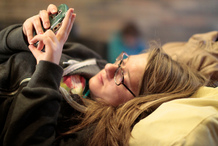 5 Things That Could Help Improve Your Sleep 1. Sleep in a dark room - When going to sleep at night make sure the drapes are drawn, the computer is off or out of the room, and any other possible sources of light are blocked out. Your brain responds to darkness by producing more of the 'sleep time hormone' melatonin, so if there is too much light you may not be producing enough melatonin to send you off to a good night sleep. 2. Keep a regular bedtime and wake up time - Going to bed and waking up at the same time each day helps to support your circadian rhythms, which is the natural rhythm your body develops that runs all your physiologically processes in a given day. Having a consist sleep time will allow your body to know when to prep for sleep so you get better sleep easier. 3. Decrease the Stimulants - Anything that contains caffeine (coffee, black tea, most soft drinks, etc.) can contribute to sleep problems. Stimulants have the effect of increasing our sympathetic response, also called the fight or flight response. The body needs to be in parasympathetic mode in order to rest. Consuming less or cutting out stimulants can be very helpful with getting more sleep.
4. Herbal Teas
- A nice soothing cup of tea before bed can make getting to sleep that much easier. There are many ‘sleepy time’ type teas on the market at the grocery store, health food store or local tea shop. One common tea is chamomile, which is very soothing for the nervous system, among other properties. Consider consulting a health care practitioner, such as a Naturopath, for herbal suggestions that will best suit your needs. 5. Acupuncture - Acupuncture has been used for all kinds of conditions for thousands of years as part of Traditional Chinese Medicine. Insomnia, or difficulty sleeping, can be very effectively addressed through Acupuncture. A preliminary report in 2004 found that in patients with anxiety, acupuncture increased nighttime melatonin production and total sleep time. The patients who received acupuncture fell asleep faster, woke less during the night, and were less stressed. The researchers concluded that, “Acupuncture treatment may be of value for some categories of anxious patients with insomnia.” Note: This does not represent an exhaustive list of possibilities for dealing with insomnia. If you suffer from insomnia and require more information, contact your Naturopathic Doctor to find out how they can help you with your health care needs. References: 1. Spence, DW. et al. (2004). Acupuncture increases nocturnal melatonin secretion and reduces insomnia and anxiety: a preliminary report. J Neuropsychiatry Clin Neurosci. Winter;16(1):19-28. 2. Nutrition and Healthy Eating. http://www.mayoclinic.com/health/caffeine/AN01211. Copyright Oct. 1, 2011.
0 Comments
Leave a Reply. |
Sarah Connors
I am a Naturopathic Doctor and Doula providing care in the Kitchener-Waterloo area. I have a passion for helping people with their health issues and improving the birth experience for Moms, and their babies. I also have a life long love affair with soccer, curling, and the alto saxophone. Archives
November 2020
Categories
All
|
Photos from Rural Royalty, manu flickr2010, Ryan Dickey, wocintechchat, huskyte77, paulswansen, Black Room Photography, harum.koh, Emery Co Photo, JeepersMedia, BrownGuacamole, wellnesswildflower, JeepersMedia, vastateparksstaff, colindunn, seelensturm, /\ \/\/ /\, 50mm.za, The Simpsons (Lee, Shirley, Luke and Rachel), AGRONAUTI, aivas14, Jonathan Rolande, winnifredxoxo, juhansonin, osseous, nan palmero, Theo Crazzolara, brianfagan, TP studio, wuestenigel, torbakhopper, anka.albrecht, Michael Stern, [-ChristiaN-], franchiseopportunitiesphotos, terren in Virginia, nateOne, barnimages.com, Dun.can, wuestenigel, @lattefarsan, amandabhslater, aphrodite-in-nyc, nutritionaldoublethink, Anne Worner, donnierayjones, mikecogh, angeloangelo, Rob.Bertholf, getaiwan, Lida Rose, matsuyuki, SurFeRGiRL30, marcoverch, amsfrank, mdaltry, nutrition education, Mike Prince, Edsel L, Neighborhood Nini, philipp.alexander.ernst, Mediocre2010, homethods, quinn.anya, Gamma Man, katerha, Eric Kilby, National Institutes of Health (NIH), rcmd_cfdfw_5_2, curtis palmer, Ray in Manila, frankieleon, Airsoftpal.com, byzantiumbooks, cchana, Brian Legate, Matt Lavin, BradHinton, monpetitchouphotography, wuestenigel, alexisjordanlewis, ByEPhotos, erix!, RLHyde, return the sun, quinn.anya, mliu92, frankieleon, loudista, Lyn Lomasi, upslon, derrickbrutel, cchana, National Institutes of Health (NIH), watts_photos, marcoverch, derrickbrutel, francesbean, weegeebored, Airsoftpal.com, Etwood, wu_135, shixart1985, Ingrid Taylar, VeritasFotografie, BioDivLibrary, emmanuelmorales1, Thanks for 1.5 Million Views!!, Will Merydith, reader of the pack, RoxyHobbs, Khanelle Prod' Medias, storyvillegirl, agromonitor, Arenamontanus, six:eleven, cote, SweetOnVeg, nenoirenediaz, lucianvenutian, markhillary, anotherlunch.com, inkknife_2000, archibald jude, rawtrigger, Imaginary Museum Projects: News Tableaus, Pavel P., Courtney Emery, Thien Gretchen, physiognomist, bark, Michigan Municipal League (MML), alberth2, Merelymel13, neofob, Care_SMC, Parker Knight, B*2
 RSS Feed
RSS Feed
